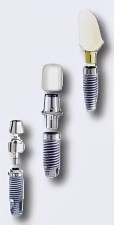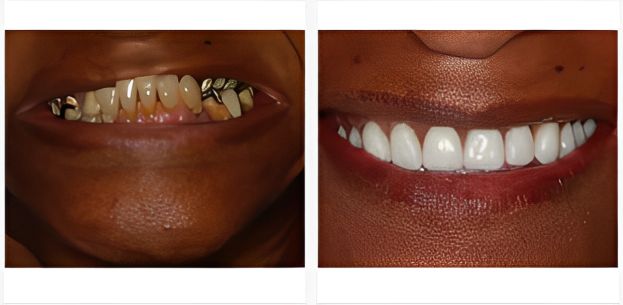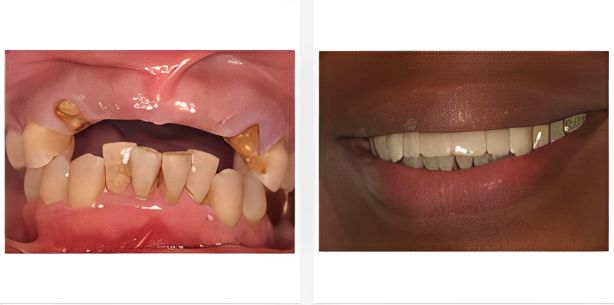Nonetheless The Best Choice Tooth Replacement Procedure
Dental Implants fail for a great number of reasons. Rarely do they go bad because of product failure.
Implant Dentistry, as a treatment, is one of the most technique specific procedures practiced by experienced implant dentists, oral surgeons and periodontists.
Precise selection of an appropriate implant device for a particular tooth replacement or anchoring device is as critical as the assessment and preparation of the underlying bone structures. Attention to detail is a must to assure the long term success that implants are known for.

Dr. Winter uses a variety of advanced assessment technologies that provide him with the technical data needed for determining what size, type and abutment is needed for each and every implant, regardless of it’s positioning in the mandible or maxillary (lower or upper) jaw structures.
Over Dr. Richard Winter’s 29 years in practice and ongoing post graduate training he has accumulated information that can help to accurately select and implement advanced implant reconstructions. As a Board Certified Implant Dentist with the American Board of Oral Implantologists/Implant Dentists (Only 535 doctors have achieved this designation), Dr. Winter has been through a rigorous examination to achieve the most difficult implant credentials attainable today! Dr. Winter works closely with other specialists when required to insure optimal bone grafting and implant treatment is performed and when an implant fails he has the ability to do revision surgeries to help preserve some sick implants. The use of the LightScalpel 10,600 laser is one device to help treat failing implants and when implants need removal, Dr. Winter has a Piezo surgical device that uses micro-movement and ultra-sonic technology to remove bone around implants to make explantation easier and more predictable. This piezo device also helps make sinus lifts more atraumatic and helps decrease problems with this procedure.
Implants can fail due to many problems:
There can be surgical complications, prosthetic complications, biologic complications and any of these can cause an expensive implant procedure to end up failing.
It is important to see your dentist regularly to maintain your implants and we recommend 3 month cleanings for all advanced implant reconstructions so we can monitor your bite and prevent failures from shifting bites or wearing prostheses.
Dental Implants In Milwaukee Before & After


Anatomy of Common Failures
- Mildly Loose
- Wobbly
- Rotation
- Painful or Sensitive
- Loose Restoration (crown)
- Falling Out
- Strong Taste or Odor
Dental implant failure can occur for a few different reasons. Facial or dental trauma is one that is extraordinarily rare. The most common reason for implant failure is a condition called peri-implantitis. This is an infection that could be likened to periodontal disease. The infection may stem from a lack of sufficient oral care. If you're considering getting dental implants or you already have them, it is important to talk with your dentist or hygienist about how you can brush and floss most efficiently.
Another reason that dental implants might fail is a lack of adequate bone density. In this case, the implant post may never integrate into the jawbone as well as it must to fully support chewing function long term. Dr. Winter takes exceptional care during your consultation and examination to determine if you are a good candidate for dental implants. The thoroughness of your examination helps us plan accordingly. In some cases, bone grafting is performed ahead of the dental implant procedure to build up the structure around the post.
According to statistics, approximately 95 percent of dental implant cases are successful. This means that the implants integrate fully into the jawbone and that implant-supported restorations perform well over a long period of time. Implant failure is extremely rare.
How Often Do Implants Fail?
Why do Dental Implants Fail?
What are the Signs of Failing Implants?
It is important to know the signs of dental implant failure so you can schedule a visit with us as soon as possible should a complication occur. The most common sign of potential implant failure is pain. It is perfectly normal, and expected, for minor discomfort to occur in the few days after the dental implant procedure. Prolonged pain or pain that comes in waves of throbbing discomfort, however, is not normal and may indicate a problem with the dental implant. When your dental implant is fully integrated as intended, it should be completely inconspicuous. You should not be aware of its presence. If you "feel" the implant when biting or chewing, it could be that the post is not integrating well or has begun making micro-movements in the jawbone. Finally, gum swelling or recession that occurs around the implant-supported tooth could be an early sign of implant failure. These symptoms could be the first indication of peri-implantitis and may be correctable with appropriate dental care.
How can I Protect My Dental Implants from Failing?
It is ideal to consider how to prevent dental implant failure as you move forward in your dental implant treatment process. From the outset, you can reduce your chances of implant failure by carefully selecting an implant dentist who has considerable training and experience performing this procedure. We welcome your questions about this when you contact us for a consult! Once you've selected your implant dentist, you can take additional steps to preserve your dental implants even before your procedure. The top suggestions include avoiding smoking and the use of all tobacco products and taking excellent care of your teeth and gums. This involves brushing twice a day for two minutes each time. Daily flossing is also a must. Diligence with oral care before getting dental implants can build great habits well in advance of needing to maintain your new restorations. After receiving dental implants, you may make slight modifications to your habits or diet. For example, it can be beneficial to limit the consumption of hard, crunchy foods that tax your teeth and implants. If you have a medical history of Diabetes or Rheumatoid arthritis, let Dr. Winter know right away as these are contra-indications to even having dental implants. While implants are a wonderful modality to help people that have or will lose teeth, it is important that you work closely with Dr. Winter and his associates to insure you will have the right treatment for your unique situation.
Having regular dental care and frequent cleanings and x-rays will allow us to evaluate the health of your implants. If you have inflammation, pus, or bone loss there is a possibility we can do revision surgery. We clean the implant surface that is exposed, add bone grafting and a membrane to stabilize and detoxify the implant and allow it to remain in function. So frequent cleanings are imperative to keeping your implants healthy and well maintained. Also checking your bite to insure ideal implant occlusion will prevent the implant from being overloaded with too much force which can also cause pre-mature implant failure.
What are the Treatment Options if My Implants Fail?
Experiencing dental implant failure is not catastrophic. Your smile and chewing function can very likely be restored once again with appropriate treatment. Do not put off seeing your dentist if you notice changes in your bite, gums, artificial teeth, or the feel of your implant. If your implant has failed, we can determine why and then plan corrective treatment around the cause. For example, if you develop peri-implantitis, Dr. Winter might remove the dental implant and treat the socket and surrounding tissue to eliminate the infection. Once the infection is resolved, a new implant can be placed. We can discuss the options that may be appropriate for you after gaining a clear understanding of your symptoms and, if implant failure is involved, what has caused the problem.
Schedule An Appointment
To avoid dental implant failure when undergoing treatment in Milwaukee, WI it's important to choose a dentist with an established reputation for success. Call us today at 414-464-9021 for more information.
Check out our Dental Blog >>
Read our Patient Case Studies >>
Hampton Dental Associates is proud to offer affordable dentistry programs to help you regain your perfect smile.
Learn more about our affordable dentistry options.



